| Listing 1 - 10 of 17 | << page >> |
Sort by
|
Article
Abstract | Keywords | Export | Availability | Bookmark
 Loading...
Loading...Choose an application
- Reference Manager
- EndNote
- RefWorks (Direct export to RefWorks)
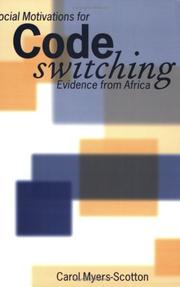
ISBN: 0198239238 Year: 1995 Publisher: Oxford [etc.] : Oxford University Press,
Abstract | Keywords | Export | Availability | Bookmark
 Loading...
Loading...Choose an application
- Reference Manager
- EndNote
- RefWorks (Direct export to RefWorks)
Codeswitching may be broadly defined as the use of two or more linguistic varieties in the same conversation. Using data from multilingual African context, Carol Myers-Scotton advances a theoretical argument which aims at a general explanation of the motivations underlying the phenomenon. She treats codeswitching as a type of skilled performance, not as the 'alternative strategy' of a person who cannot carry on a conversation in the language in which it began. Speakers exploit the socio=psychological values associated with different linguistic varieties in a particular speech community: by switching codes speakers negotiate a change in social distance between themselves and other participants in a conversation. Switching between languages has much in common with making stylistic choices within the same language: it is as if bilingual and multilingual speakers have an additional style at their command when they engage in codeswitching.
CHANGEMENT DE CODE (LINGUISTIQUE) --- SOCIOLINGUISTIQUE --- MARQUE (LINGUISTIQUE) --- AFRIQUE --- AFRIQUE --- CHANGEMENT DE CODE (LINGUISTIQUE) --- SOCIOLINGUISTIQUE --- MARQUE (LINGUISTIQUE) --- AFRIQUE --- AFRIQUE
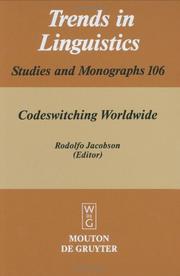

ISBN: 3110151510 3110812193 9783110812190 9783110151510 Year: 2011 Volume: 106 Publisher: Berlin Boston
Abstract | Keywords | Export | Availability | Bookmark
 Loading...
Loading...Choose an application
- Reference Manager
- EndNote
- RefWorks (Direct export to RefWorks)
No detailed description available for "CODESWITCHING WORLDWIDE 1 (JACOBSON) TILSM 106 E-BOOK".
Code switching (Linguistics) --- Bilingualism --- Changement de code (Linguistique) --- Bilinguisme --- Language shift --- Switching (Linguistics) --- Linguistics --- Diglossia (Linguistics) --- Script switching (Linguistics)
Multi
ISBN: 9517650809 Year: 2001 Publisher: Åbo Åbo akademis förlag
Abstract | Keywords | Export | Availability | Bookmark
 Loading...
Loading...Choose an application
- Reference Manager
- EndNote
- RefWorks (Direct export to RefWorks)
Theses --- Bilingualism --- Code switching (Linguistics) --- Finnish language --- Hungarian language --- Code switching (Linguistics). --- CHANGEMENT DE CODE (LINGUISTIQUE) --- FINNOIS (LANGUE) --- HONGROIS (LANGUE) --- BILINGUISME --- AUSTRALIE

ISBN: 9027225419 9786613359322 1283359324 9027279993 9789027279996 9789027225412 9781283359320 6613359327 Year: 1984 Volume: vol 8 Publisher: Amsterdam Benjamins
Abstract | Keywords | Export | Availability | Bookmark
 Loading...
Loading...Choose an application
- Reference Manager
- EndNote
- RefWorks (Direct export to RefWorks)
Code-switching and related phenomena have met with linguists' increasing interest over the last decade. However, much of the research has been restricted to the structural (grammatical) properties of the use of two languages in conversation; scholars who have tried to capture the interactive meaning of switching have often failed to go beyond more or less anecdotal descriptions of individual, particularly striking, cases. The book bridges this gap by providing a coherent, comprehensive and generative model for language alternation, drawing on recent trends and methods in conversational analysis. The empirical basis is the speech of Italian migrant children in Constance, Germany.
Pragmatics --- Conversatie. --- Codewisseling [Taalwetenschap]. --- Bilinguisme --- Conversation. --- Codes (Passage de) [Linguistique]. --- Tweetaligheid. --- Code switching (Linguistics) --- Talking --- Colloquial language --- Etiquette --- Oral communication --- Language shift --- Switching (Linguistics) --- Bilingualism --- Linguistics --- Diglossia (Linguistics) --- Script switching (Linguistics) --- Changement de code (linguistique) --- Linguistique --- Conversation
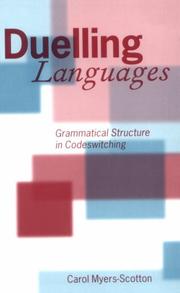
ISBN: 019823712X Year: 1993 Publisher: Oxford : Clarendon Press,
Abstract | Keywords | Export | Availability | Bookmark
 Loading...
Loading...Choose an application
- Reference Manager
- EndNote
- RefWorks (Direct export to RefWorks)
The goal of this book is to describe and explain intrasentential codeswitching - the production of two or more languages within the same sentence. Most linquists who do not study codeswitching think of it as belonging strictly in the domain of sociolinguistics. Most codeswitching studies do indeed have a social aspect, because they typically use naturally occurring performance data as their base. However, this book is just as much a study in grammatical theory as a study of language in use. The specific research question addressed is this: when speakers alternate between two or more linguistic varieties, how free is this alternation from the structural point of view? Carol Myers-Scotton develops a model of the morphosyntactic constraints on codeswitching; she concludes that the principles governing codeswitching are the same everywhere. Her findings support a lexically based model of language production.
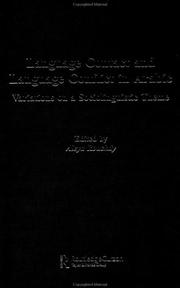
ISBN: 0700713794 0415567793 0203037219 1283886243 1136122184 1136122265 9781136122187 9780700713790 Year: 2002 Publisher: Oxon [England] : Routledge,
Abstract | Keywords | Export | Availability | Bookmark
 Loading...
Loading...Choose an application
- Reference Manager
- EndNote
- RefWorks (Direct export to RefWorks)
This book contains 17 studies by leading international scholars working on a wide range of topics in Arabic socio-linguistics, divided into four parts. The studies in Part 1 address questions of national language planning in a diglossic situation, with a particular focus on North Africa. Part 2 explores the relationship of identity and language choice in different Arabic-speaking communities living both within and outside the Arab World. Part 3 examines language choice in such diverse contexts as popular preaching, humour and Arab women's writing. Part 4 contains 5 papers in which variation,
Arabic language --- Languages in contact --- Diglossia (Linguistics) --- Code switching (Linguistics) --- Arabe (Langue) --- Arabe (Langue) à l'étranger --- Langues en contact --- Diglossie (Linguistique) --- Changement de code (Linguistique) --- Social aspects. --- Dialects --- Foreign countries --- Aspect social --- Dialectes --- Arabe (Langue) à l'étranger --- Languages in contact. --- Semitic languages --- Areal linguistics
Book
ISBN: 915544623X Year: 1999 Publisher: Uppsala Uppsala university library
Abstract | Keywords | Export | Availability | Bookmark
 Loading...
Loading...Choose an application
- Reference Manager
- EndNote
- RefWorks (Direct export to RefWorks)
Language planning --- -Language revival --- -Linguistic minorities --- -Minority languages --- Language and languages --- Minorities --- Sociolinguistics --- Language renewal --- Language revitalization --- Renewal, Language --- Restoration of languages --- Revitalization, Language --- Revival of languages --- Planned language change --- Political aspects --- Restoration --- Revival --- Planning --- Language revival --- Linguistic minorities --- -Language planning --- Minority languages --- Minoritized languages --- Scandinavie --- Changement de code (linguistique) --- Politique linguistique
Book
ISBN: 0262320355 0262027895 1322474907 0262320363 9780262320351 9780262027892 Year: 2014 Publisher: Cambridge, Massachusetts
Abstract | Keywords | Export | Availability | Bookmark
 Loading...
Loading...Choose an application
- Reference Manager
- EndNote
- RefWorks (Direct export to RefWorks)
Theoretically significant work on the grammar of codeswitching by the leading researchers in the field.
Code switching (Linguistics) --- Education, Bilingual. --- Grammaticality (Linguistics) --- Grammaticalness (Linguistics) --- Bilingual education --- Language shift --- Switching (Linguistics) --- Acceptability (Linguistics) --- Grammar, Comparative and general --- Linguistics --- Bilingualism --- Multilingual education --- Diglossia (Linguistics) --- LINGUISTICS & LANGUAGE/General --- COGNITIVE SCIENCES/General --- Changement de code (Linguistique) --- Education bilingue --- Grammaticalité --- Script switching (Linguistics)
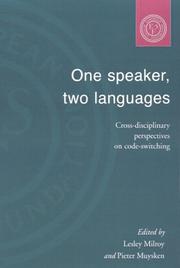
ISBN: 0521473500 0521479126 9780521473507 9780521479127 9780511620867 0511620861 Year: 1995 Publisher: Cambridge Cambridge University press
Abstract | Keywords | Export | Availability | Bookmark
 Loading...
Loading...Choose an application
- Reference Manager
- EndNote
- RefWorks (Direct export to RefWorks)
Code-switching - the alternating use of several languages by bilingual speakers - does not usually indicate lack of competence on the part of the speaker in any of the languages concerned, but results from complex bilingual skills. The reasons why people switch their codes are as varied as the directions from which linguists approach this issue, and raise many sociological, psychological, and grammatical questions. This volume of essays by leading scholars brings together the main strands of current research in four major areas: the policy implications of code-switching in specific institutional and community settings; the perspective of social theory on code-switching as a form of speech behaviour in particular social contexts; the grammatical analysis of code-switching, including the factors that constrain switching even within a sentence; and the implications of code-switching in bilingual processing and development.
Code switching (Linguistics). --- Code-switching (linguïstiek). --- Tweetaligheid. --- Language shift --- Switching (Linguistics) --- Diglossia (Linguistics) --- 800.73 --- Code switching (Linguistics) --- Bilingualism --- Linguistics --- 800.73 Tweetaligheid. Meertaligheid. Vreemde talen. Vertalen --- Tweetaligheid. Meertaligheid. Vreemde talen. Vertalen --- Psycholinguistics --- Comparative linguistics --- Sociolinguistics --- Bilingualism. --- Bilinguisme. --- Changement de code (Linguistique). --- Codewisseling. --- Sociolinguistique. --- Sprachwechsel. --- Zweisprachigkeit. --- Arts and Humanities --- Language & Linguistics --- Script switching (Linguistics)
| Listing 1 - 10 of 17 | << page >> |
Sort by
|

 Search
Search Feedback
Feedback About UniCat
About UniCat  Help
Help News
News